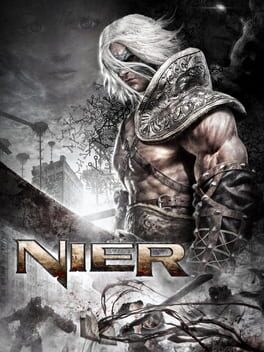Not much to say about Nier that hasn't been said countless times before. A beacon of shining light that managed to cut through a miasma of western blockbuster homogenization that was destroying Japan's videogame landscape, just by virtue of being unabashedly japanese and wearing its influences on its sleeve.
While Drakengard was a cynical product conceived out of contempt for the regressive state of videogames and created within the constraints of a marketeable Square Enix work, Nier was the opportunity for Yoko Taro and his team to create the sincere game they always wanted to make and that represented their aspirations for the interactive medium. And how beautiful of a message it was for a studio on its dying breath to make.
Shifting the detached and voyeuristic point of view from Drakengard to a much more intimate and empathetic one, Nier gives us now the chance to relate and sympathize with the broken and damaged characters of this universe, who despite the cards they were dealt with, strive to make the right decision in a world that constantly beats them down and prevents them from doing so. One of the greatest qualities of Nier is its willingness to have its cast of characters be placed in situations of emotional vulnerability and letting us sit down with them as they cry their guts out, which is something you hardly see games having the courage and honesty to do so.
I'm not sure how instrumental Nier was in the resurgence of japanese videogames era we are going through right now, but Yoko Taro managed to prove that it doesn't take a multi million dollar budget or expertise game design to provide an experience that transcends what had come before it. Nier is a game filled with outdated side quests, redundant backtracking and tedious item collecting, all glued together into a package that always seems on the verge of breaking at the seams. But it honestly doesn't matter and I don't care.
Yoko Taro put his money where his mouth is and responded to his own critique imposed by Drakengard with a genuine and compassionate work that simultaniously demonstrates what videogames are capable of when not catered to their most primal instincts, while also being proud of its inheritance and speaking through the language that its inspirations used before it, culminating in one of the greatest endings in videogame history where the player willingly sacrifices a tangible and real possession in service of a fictional character who you have grown to care for.
And yeah, having one of the best soundtracks of all time doesn't hurt either. Abuse that Emil-Sacrifice theme all you want, game. I'll gladly curl into a ball and weep everytime.
While Drakengard was a cynical product conceived out of contempt for the regressive state of videogames and created within the constraints of a marketeable Square Enix work, Nier was the opportunity for Yoko Taro and his team to create the sincere game they always wanted to make and that represented their aspirations for the interactive medium. And how beautiful of a message it was for a studio on its dying breath to make.
Shifting the detached and voyeuristic point of view from Drakengard to a much more intimate and empathetic one, Nier gives us now the chance to relate and sympathize with the broken and damaged characters of this universe, who despite the cards they were dealt with, strive to make the right decision in a world that constantly beats them down and prevents them from doing so. One of the greatest qualities of Nier is its willingness to have its cast of characters be placed in situations of emotional vulnerability and letting us sit down with them as they cry their guts out, which is something you hardly see games having the courage and honesty to do so.
I'm not sure how instrumental Nier was in the resurgence of japanese videogames era we are going through right now, but Yoko Taro managed to prove that it doesn't take a multi million dollar budget or expertise game design to provide an experience that transcends what had come before it. Nier is a game filled with outdated side quests, redundant backtracking and tedious item collecting, all glued together into a package that always seems on the verge of breaking at the seams. But it honestly doesn't matter and I don't care.
Yoko Taro put his money where his mouth is and responded to his own critique imposed by Drakengard with a genuine and compassionate work that simultaniously demonstrates what videogames are capable of when not catered to their most primal instincts, while also being proud of its inheritance and speaking through the language that its inspirations used before it, culminating in one of the greatest endings in videogame history where the player willingly sacrifices a tangible and real possession in service of a fictional character who you have grown to care for.
And yeah, having one of the best soundtracks of all time doesn't hurt either. Abuse that Emil-Sacrifice theme all you want, game. I'll gladly curl into a ball and weep everytime.
2 Comments
when he goes "Luvha dume Duhara menua lusi Luvha lue Telame fteli musui ha"
I felt that.
I felt that.

heatten
2 years ago